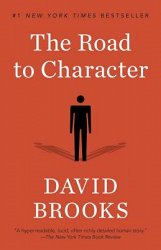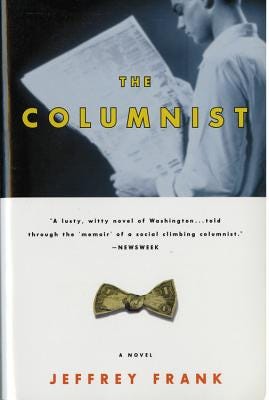I do not think I hate author and New York Times columnist David Brooks, and yet, there is no writer or public figure towards whom I have been so critical for so long.
The first recorded instance was 2004 when I published a parody of Brooks’s approach to column writing in McSweeney’s, “David Brooks Also Eats Cereal.”
There are others. Many, many, others.
I have truly read an astonishing number of words from someone whose abilities and insights I hold in such low regard. I’m not talking just his column, which has run in the Times since 2003, but also several of his books including Bobos in Paradise, The Social Animal, and The Road to Character.
There is a long list of the things I find galling about Brooks. One is that he is often cited as a purveyor of sociology, an insult to genuine sociologists, who, unlike Brooks, don’t just make things up for the convenience of the narrative.
A deeper source of my discontent is philosophical. Brooks’s diagnoses of what ails America is spiritual, a deficiency of moral character that we can apparently mend through civic self-help. I am a bigger believer in structural explanations for our large bore ills. In this vein, much of Brooks’s recent work is directed towards explicit character instruction, including in his newly released How to Know a Person: The Art of Seeing Others and Being Deeply Seen, which he previewed in his column this week.
On the surface, the book seems entirely unobjectionable, even laudatory, a call for us to extend grace and understanding to others (and ourselves). Sadly, I am skeptical because over the decades I have observed that David Brooks is frequently full of shit.
This is evidenced even in his column when he engages in a typical Brooksian exercise in categorization to describe two types of people in broad terms. (Notice the similarity to my parody above, published almost 20 years ago. The man is nothing if not consistent.)
I’m am hard-pressed to think of a writer who has been less genuinely illuminating while having more public influence in my lifetime than David Brooks. Perhaps the ur-example of his method is his infamous letter to the writer Ta-Nehisi Coates following Brooks’s reading of Coates’s Between the World and Me in which Brooks drags Coates’s complex rendering of the “American Dream” as told from his perspective to his young son in the book, to a squabble over identity politics, a framing which Coates’s work explicitly rejects, and which Brooks imposes on the book as an underhanded way to discredit it.
Brooks’s penchant to slice and dice people into easily branded categories is the opposite of illumination.
I’m not just talking about a public writer who occasionally gets things wrong. I’m talking about a guy who over and over again, tiptoes up to a genuine insight, and then backs away to the safety of belief in the correctness of the meritocratic status quo, of which he is a charter member and protector and for which he is very handsomely paid.
Brooks calls his politics moderate, but I see him as more of a Milquetoast Reactionary. He’s not even the worst of the Times “moderate” op-ed writers. Brett Stephens is a dumber, crueler version of Brooks, and Pamela Paul manages to make me cringe even when I agree with her. Neither have a detectable style in their writing, while Brooks is at least readable, and sometimes better than that. That both have so thoroughly absorbed the worst stereotypes of Boomer politics despite being Gen X is additionally infuriating.
Anyway, Brooks obviously bugs the crap out of me, probably because he is so influential because of his willingness to tell people in power what they want to hear.
At the same time, I’ve also found the person underneath the image somewhat fascinating far more fascinating than say Stephens and Paul who are easily tagged as ambitious creeps eager to curry favor with power. For all of Brooks’s status within the status quo, and his frequent cluelessness, he often also seems genuine and sincere in ways the trolling of Stephens and Paul never achieve.
The most recent books in Brooks’s oeuvre take on a partial sheen of self-help. For his current book he says he wanted to learn how to know a person because it would make him a better co-worker, boss, and even citizen.
He says he wrote the Road to Character in part to learn how character manifests itself so he could do better. I don’t know what it says about what he learned that concurrent with producing the book he divorced his wife of twenty-seven years and married his research assistant who was born a year after the start of Brooks’s first marriage.
Public intellectual, heal thyself, I guess.
In college, Brooks was supposedly a young leftist, but soon after graduation hit the conservative publication gravy train moving from the National Review to the Hoover Institute, and then on to the Wall Street Journal before the Times, where he was recruited by Gail Collins because Brooks was “the kind of conservative writer that wouldn't make our readers shriek and throw the paper out the window.”
Au contraire, Gail.
Brooks’s commitment to being reasonable in what I believe to be unreasonable times simply cannot be schtick. If so, it’s the longest and most consistent performance imaginable. Even if Brooks’s persona is a construction of his own making he’s disappeared so far inside of it, this by itself would be fascinating.
I’m not sure where this impulse comes from, but when I am bothered by this sort of thinking, I sometimes find myself writing fiction from the point of view from the figure that perplexes me. Most of these stories don’t go anywhere, but I’ve started a handful of pieces from the points of view of conservative public figures, I suppose as an exercise in illumination for myself. I have partially finished pieces from the points of view of Megyn Kelly and - believe it or not - Tucker Carlson, and a completed story from the point of view of George Conway (now ex) husband of Kellyanne Conway, which sought to make sense of his obviously strained marriage.
I also finished a story from the perspective of David Brooks that I called “The Road to the Road to Character” centered on the moment in which he confronts the face that he would like to end his marriage in order to pursue a relationship with his 20-something research assistant. As I thought about Brooks, I began to see him as something of a Reverend Dimmesdale character from The Scarlet Letter, a man trapped by the gap between his private behaviors and his public self, a public self which must be maintained at all costs, and which must come with some costs.
I put the story up on Medium years ago and have let it sit there since, but I’ve now imported here to Substack and if anyone is curious about where one’s mind goes when they’re trying to figure out the inner life of their bête noire, well, here you go:
In the column drawn from his new book, Brooks talks about the necessity and joy of getting to know others well through listening and questioning and inviting engagement. Perhaps in this spirit he would approve of what I have imagined about a character who shares certain aspects of David Brooks’s biography, but who also is obviously not David Brooks.
I know that having written the story and now reading it again for the first time in years as I prepared this newsletter, I feel some measure of compassion for this man who seems so desperate to figure out what he’s supposed to believe.
Maybe that’s the same struggle we all have.
Links
At the Chicago Tribune this week I weigh in with my befuddlement about what the heck Michael Lewis was thinking as he wrote his book on Sam Bankman-Fried. For a more thorough dissection thanks to a greater word count, I recommend David Roth’s effort, which benefits from both his incisive analysis and a longer word count.
John Freeman writes a moving and perceptive reflection on the end of his eponymous literary journal, Freeman’s.
The trailer for American Fiction a forthcoming movie adapted from Percival Everett’s Erasure, looks very promising.
The New York Times is recommending nine new books this week, including one very much on my radar, Ben Fountain’s Devil Makes Three.
A classic via McSweeney’s this week, “Nietzsche’s Google Search.”
Recommendations
“Thus Spoke Zarathustra” by Fredrich Nietzsche
“Light in August” William Faulkner
“Siddhartha” by Herman Hesse
“Swan’s Way” by Marcel Proust
“Austerlitz” by W.G. Sebald
Niko P. - Budapest, Hungary
Some very light reading! Niko has really been slacking off on the old difficulty front. Part of me wants to lean into something with a bit of lightness in it, but clearly this is a reader who knows what they like. Celine’s Journey to the End of Night is at least humorous, though in a particularly scathing way. If Niko hasn’t read it, I think it’ll be right in his wheelhouse.1
If you’ve noticed that the links seem a little thin, it’s because I’m off Twitter almost entirely, which is where I used to be able to find lots of interesting book-related things to read. I’m slowly rebuilding that source of information at Bluesky, but it’s a long process. If you’ve seen something book related that caught your fancy this week, share it in the comments for all of us to enjoy.
Your support through a free or paid subscription is always quite welcome.
Seriously, is it weird to write short stories from the points of view of famous living people? Don’t tell me. I’d rather live in my delusion.
If you’re looking for a very entertaining novel told from the point of view of a fictional power broker columnist, I recommend Jeffrey Frank’s The Columnist, that I was turned on to be David Sedaris at one of his readings many many years ago.
Have a wonderful week, one and all.
JW
The Biblioracle
All books linked throughout the newsletter go to The Biblioracle Recommends bookstore at Bookshop.org. Affiliate proceeds, plus a personal matching donation of my own, go to Chicago’s Open Books and the Teacher Salary Project, which is advocating to establish a federal minimum salary for teachers of $60,000 per year. Affiliate income is $251.80 for the year.








I am so happy that you are off Twitter. Thank you. People seem to continue to offer excuses for why they stay on it.
I grew up hating David Brooks for his dour hypocrisy - Shields was so merry (and politically spot-on). I was able to ignore Brooks as an adult, coming of age with the internet and so on, until lockdown when I had public radio on constantly to keep from tearing my hair out. For some reason, his “reasonable” advice on how to build character pushed all my buttons, even more so than the blatant BS coming from Cuomo, Trump and everyone else. Thank you for commiserating. I found this post because someone I volunteer with on a local arts non profit sent around a Brooks column, allowing us to congratulate ourselves on the good work we’re doing. Instead, I rage-typed “Why is David Brooks such a hypocrite?” in my search bot, and, maybe AI isn’t such a bad evil overlord after all, because I landed here. 🙏 thanks Darth Google 🙌. The Road to the Road to Character was the Saturday afternoon read I needed.